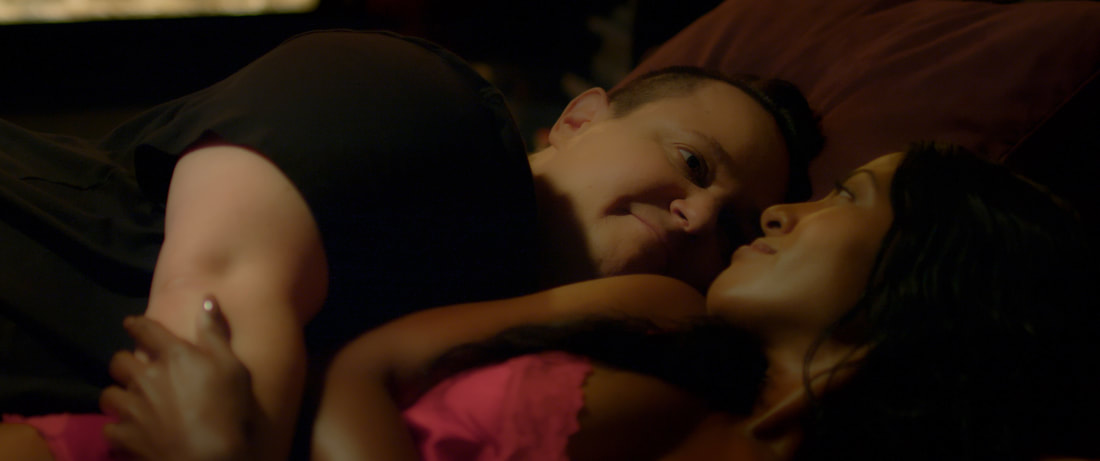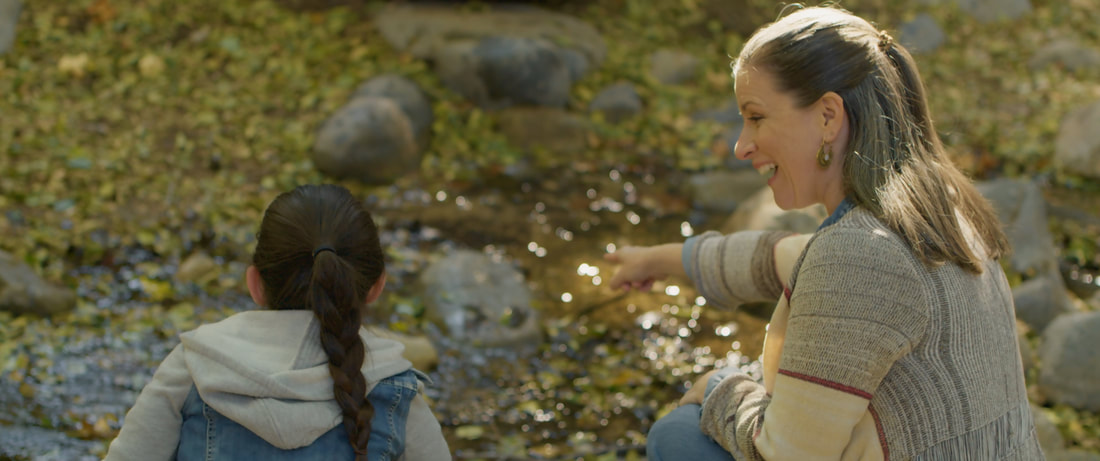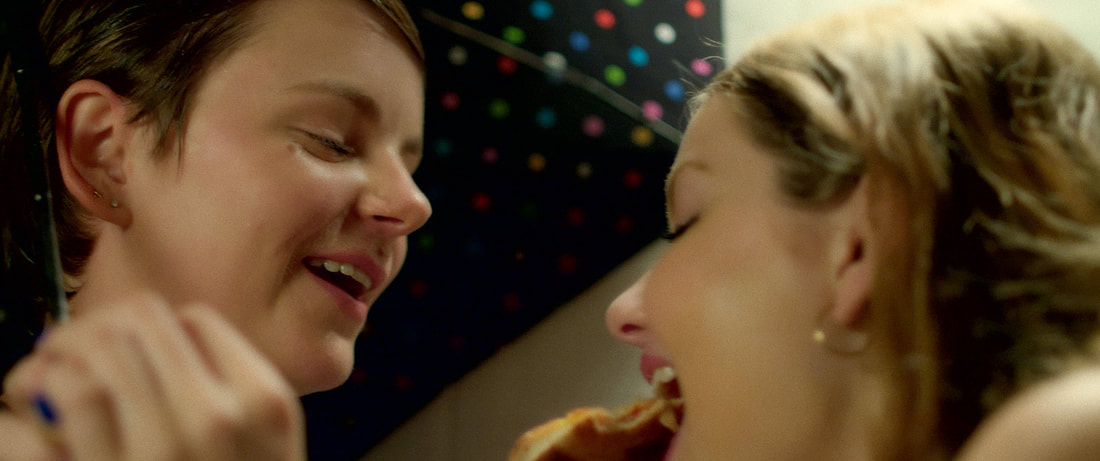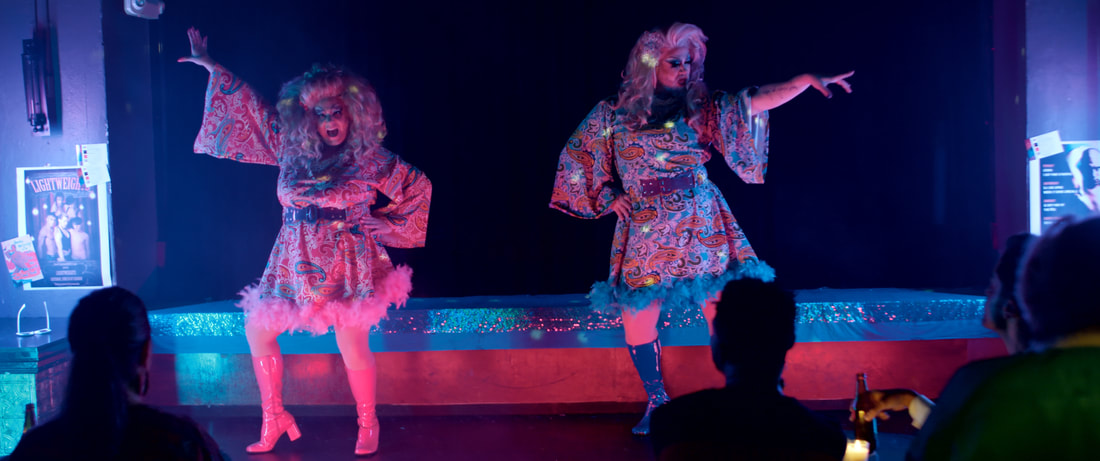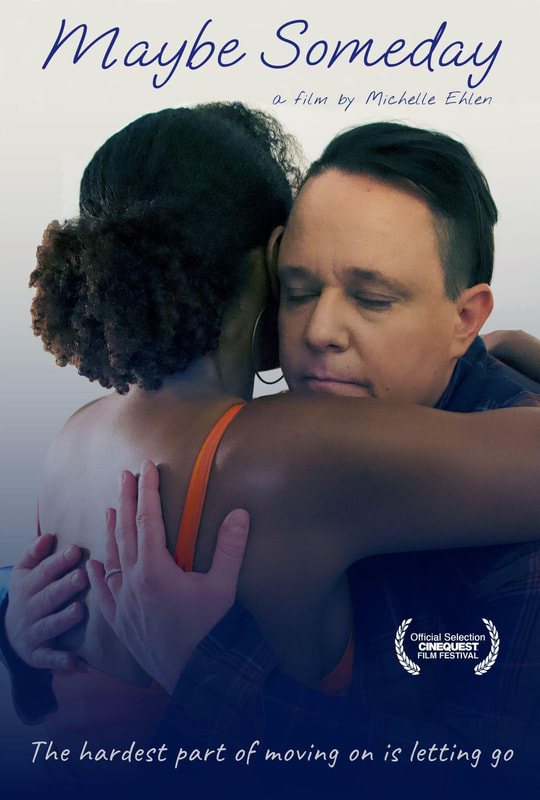|
Maybe someday I’ll take a vacation. Maybe someday I’ll reconnect with my best friend from high school. Everyone has their “maybe someday” — and for Jay (Michelle Ehlen), the subject of the feature film Maybe Someday, her wish for the future is to restore her relationship with her wife, Lily (Jeneen Robinson). But Jay knows that before she can make things work with her wife, she has to take some time to herself. So, she packs up a duffle bag and makes plans to move, at least temporarily, to Los Angeles, where she’ll focus on her photography career. On the way, she decides to visit her best friend from her teen years, Jess (Shaela Cook), and ends up staying with Jess for a while as she finds her emotional bearings. The majority of Maybe Someday takes place during this extended visit. As Jay confronts formative moments from her past and grapples with heartbreak, she also befriends a very unlikely sidekick, Tommy (Charlie Steers), a wannabe standup comedian who complicates the gay best friend stereotype. All the while, Jay holds out hope that her “maybe someday” wish will happen sooner rather than later. Maybe Someday is the fifth feature film from writer / director Michelle Ehlen, who also stars as Jay. In this film, Ehlen takes a very realistic approach to storytelling, reserving the magical, cinematic moments for flashback scenes in which Jay remembers her teen years. Ehlen doesn’t force drama or big emotional moments into the script, but instead develops conflict organically through dialogue. Maybe Someday has a free-flowing dramatic progression that mimics the mundaneness of everyday life. As a result, the movie may seem slow to viewers who prefer straightforward plot development. However, Ehlen makes those everyday moments interesting by connecting them to Jay’s memories of adolescence. Jay’s flashbacks are brighter, more colorful, and more hopeful than her present reality, giving viewers brief resting periods from the restrained tone and neutral color palette of the film. Ehlen connects these flashbacks to Jay’s present with soft rock songs that ease viewers into the excitement and nostalgia of Jay’s younger years. As a whole, the structure of the film compares and contrasts coming of age dilemmas with the struggles of a midlife crisis. Ehlen also makes the film interesting in more subtle ways — particularly through her performance. Jay is a quiet, introspective character, but we can learn a lot about her through Ehlen’s expressions and body language. She’s extremely talented when it comes to subtle acting, and the artful cinematography by Wenting Deng Fisher highlights the tiny changes in expression that make Ehlen’s performance so powerful. She makes the most of Jay’s silent moments, letting viewers in on the private emotional journey of a person going through heartbreak. When she does express more direct and dramatic emotions, her performance doesn’t seem like a performance at all. It comes across natural and realistic, as if we’re watching heartbreak in real-time. Much like the film as a whole, Ehlen’s performance is quiet and unpresumptuous, which makes it all the more powerful. Her acting is complemented by a solid and mature performance from Eliza Blair, who plays young Jay during the flashbacks. On the other hand, Steers takes a head-on approach to his performance as the dramatic and (at times) self-absorbed sidekick. Tommy is a loud and unashamed character who contrasts with the subdued, neutral tone of the film. As a result, he often seems out of place in Jay’s world. But tonal cohesiveness aside, Tommy adds a handful of interesting themes to the mix. Jay first meets Tommy while she’s taking pictures for a local comedy class. Tommy's jokes are self-indulgent and tasteless, and at first, his general attitude reflects that of an ignorant frat boy rather than a comedic best friend. It would be easy to say that Tommy is all over the place and unlikable, but you can’t deny that his character is unique. He challenges viewers to reexamine stereotypes and binaries and to see the characters in the film as real, complex people, not LGBTQ+ stereotypes. Maybe Someday is bittersweet and genuine. While its realistic style keeps the pace slow, it never abandons the integrity of its characters for the sake of drama. The story is full of universal themes about falling in love, falling out of love, denial, and growing up, but Ehlen gives such a strong performance that Jay’s story feels unique and specific. As it explores both the mundane and the breathtaking sides of love, illustrating heartbreak in a mature and controlled way, Maybe Someday won’t sweep you off your feet the way that some dramas do. Instead, it will hook you and reel you in slowly with its soft, muted color palette, nostalgic soundtrack, empathetic characters and honest performances. You can watch Maybe Someday during the virtual Cinejoy Film Festival, April 1-17, 2022. Head over to the Cinejoy site to purchase a ticket.
0 Comments
Leave a Reply. |
"Our embodied spectator, possibly perverse in her fantasies and diverse in her experience, possesses agency...finally, she must now be held accountable for it." Categories
All
|


